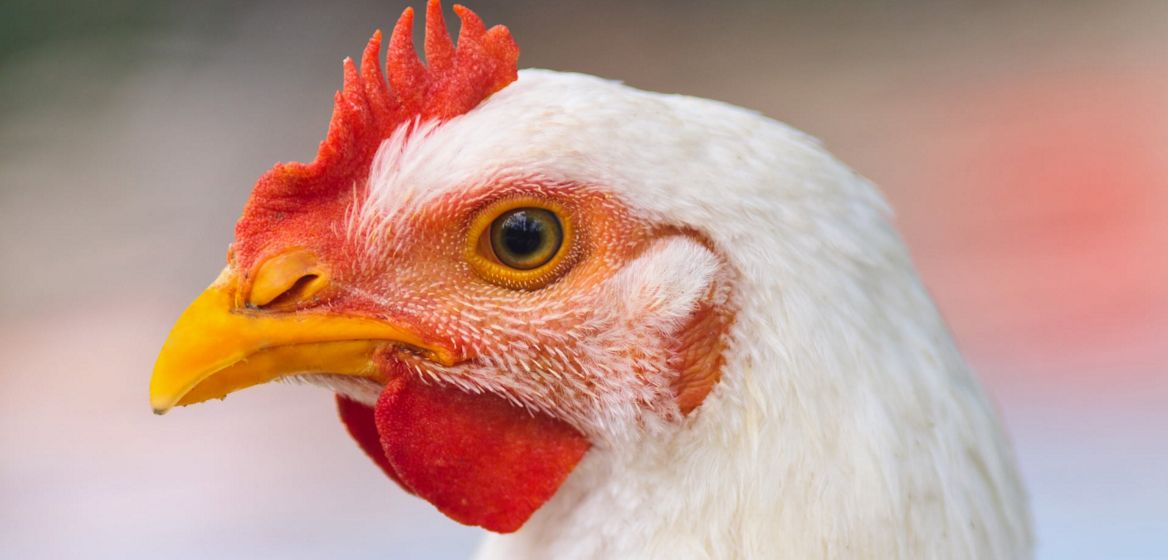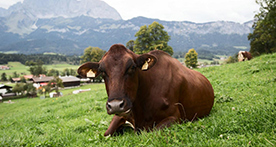Responsible Antibiotic Use
We are working toward the responsible use of antibiotics in our supply chain, including reducing their use and not permitting routine use of medically important antibiotics in food animal production.
Our long-standing commitment to reducing antibiotic use in food animals – including those defined as medically important antibiotics by the World Health Organization (WHO) – stretches back to 2003, when we first outlined McDonald’s position.
Highest-Priority Critically Important Antibiotics (HPCIAs) in human medicine have been eliminated for use in raising chickens for Australia, Brazil, Canada, Europe, Japan, South Korea and the U.S., with China expected to comply before the end of 2027. Additionally, we are working to drive responsible use of antibiotics in our global beef supply chain for 10 in-scope markets, and since 2023 have been working with our suppliers to establish data systems that will help enable future measurement of antibiotic use.1 We actively work with our supply chain to collect antibiotic use data associated with global beef industries across our 10 in-scope markets, leveraging independent third parties to facilitate data aggregation.
See our latest Purpose & Impact Report on the Goal Performance & Reporting page for updates on our progress.
Our Strategy
Through our commitment to responsible antibiotic use, we are collaboratively doing our part to help preserve the effectiveness of antibiotics for future generations. According to the WHO, “over-use and misuse of antibiotics in animals and humans is contributing to the rising threat of antibiotic resistance.”2
Our policies do not permit the routine use of medically important antibiotics for the purpose of growth promotion or the habitual use of antibiotics for disease prevention.3
Our focus is on refining antibiotic selection and administration, reducing non-therapeutic antibiotic use and, when possible, replacing antibiotics with long-term solutions to proactively prevent disease and protect animal health and welfare. We remain committed to the treatment of sick animals aligned with herd/flock veterinarian direction to ensure the safety of our supply chain.
Our Responsible Use Approach to Help Ensure Animal Health
McDonald’s will collaboratively do its part to advance practices related to the responsible use of antibiotics, following guidelines set out by the WHO, the World Organization for Animal Health (WOAH, formerly the OIE) and other recognized public and animal health bodies.
We strive to contribute to antibiotic effectiveness for future generations by working across our industry and supply chain with producers, veterinarians, academics and other experts in the field. We intend to use our voice to advocate for increased transparency, data collection and policies to enable better assessment and, where possible, reduction in use across the industry.
We are committed to a responsible use approach, as outlined in our revised 2017 Vision for Antibiotic Stewardship (VAS) (PDF – 183KB). We believe reducing overdependence on antibiotics within our supply chain complements our decades-long commitment to managing and improving the health and welfare of animals.
We engage with academia, suppliers, farmers and ranchers, NGOs, veterinary networks and others who have a deep understanding of these issues and how to achieve progress. As a founding member of the International Consortium for Antimicrobial Stewardship in Agriculture (ICASA), we work to identify and help advance commercial solutions to address antimicrobial resistance (AMR).
Our protein-specific policies are based on the WHO “One Health” approach, which emphasizes the need for collaborative, multi-discipline efforts at local, national and global levels to attain optimal health for people, animals and the environment.
For more information on our approach to individual protein supply chains, see Advocating for Responsible Antibiotic Use in Beef, Advocating for Responsible Antibiotic Use in Chicken and Advocating for Responsible Antibiotic Use in Pork.
Advocating for Responsible Antibiotic Use in Beef
In 2018, we implemented McDonald’s Antibiotic Policy for Our Beef Supply Chain (PDF – 246 KB). It is informed by our VAS and follows global guidance from expert bodies like the WHO and WOAH. This policy identifies McDonald’s expectations and anticipated implementation plans with respect to antibiotic use in our beef supply chain while complying with local laws and regulations. It focuses on the following beef sourcing countries: Australia, Brazil, Canada, France, Germany, Ireland, New Zealand, Poland, the U.K. and the U.S.
Improving Data Capabilities
Our intention is to help drive positive behavioral change and transparency, and to enable comprehensive assessment of antibiotic use across our supply chain in the future. Following the establishment of our goals, we have been working to improve access to quality data and measurement capabilities for antibiotic use trends across our supply chain. While this data doesn’t yet exist, it will be vital for McDonald’s – and our wider industry – to begin making progress against our goals. We have been working with supply chain partners to identify and enhance access to data on antibiotic use.
Additional details on the targets established for specific markets and sectors can be found on page 7 of our Antibiotic Policy for Our Beef Supply Chain (PDF – 245 KB).
Advocating for Responsible Antibiotic Use in Chicken
Since February 2019, we’ve tracked the use of medically important antibiotics in the supply chain supporting our top chicken sales markets. Producer data collection is managed by our third-party provider, the Food Animal Initiative (FAI). In 2017, we implemented our Chicken Antibiotics Policy, which includes eliminating the use of HPCIAs as well as not permitting the routine use of antibiotics for disease prevention or growth promotion, in our top chicken sales markets around the world.4 All but one of our in-scope markets have now completed the work and become fully compliant with our policy to eliminate the use of HPCIAs in our chicken supply; the remaining market has a deadline of 2027 to achieve compliance. Progress updates can be found in our latest Purpose & Impact Report.
Advocating for Responsible Antibiotic Use in Pork
We are advancing our work on the responsible use of antibiotics in our pork supply chain. In 2021, we created a global, cross-functional working group to help develop a policy anchored to responsible use. This draft policy was introduced to our global suppliers, who were asked to conduct assessments of the gap between McDonald’s draft criteria and expectations and their current internal policies on antibiotic use. In 2022, we evaluated supplier feedback and continued to leverage insights to inform updates to our policy.
In 2023, as we awaited updated guidance from the WHO on antibiotic reclassifications, we shared a draft policy with suppliers and focused our efforts on identifying and developing processes for accessing and collecting data on antibiotics use across our markets. This work continued in 2024. As an example, in China, we have begun data collection, leveraging insights and practices from our poultry antibiotics approach; in the U.K. and Germany, we are looking to voluntary reporting of information on antibiotic use; and in the U.S., together with our suppliers, we are currently collaborating with the U.S. pork industry to understand the potential for developing a database model for reporting antibiotic use data. We plan to update the policy to remain aligned to WHO guidance.
Footnotes
1 Beef antibiotic use: This goal focuses on Australia, Brazil, Canada, France, Germany, Ireland, New Zealand, Poland, the U.K. and the U.S., which represented our top 10 beef sourcing countries and accounted for over 80% of our global beef supply chain as of the end of 2022.
2 Source: WHO, Stop using antibiotics in healthy animals to prevent the spread of antibiotic resistance.
3 This is applicable to our existing antibiotic use policies for chicken and beef supply chains. Beef antibiotic use: Habitual use of medically important antibiotics for disease prevention is a probable indication of an underlying herd-specific and/or management issue and is not permitted except in the following narrowly defined situations: based upon the determination of a qualified veterinarian familiar with the disease history in the herd, non-routine prevention uses may be permitted if there is a high risk of contraction of a particularly infectious disease. If use is deemed necessary and when effective multiple treatment options exist, McDonald’s encourages adoption of a tiered approach to antibiotic selection – least important to human medicine being the first choice, with HPCIAs reserved for last resort. See Antibiotic Policy for Our Beef Supply Chain (PDF – 245 KB). for further information. Chicken: Antibiotics shall not be used for routine prevention or for growth promotion. In addition, antibiotics shall only be prescribed by a licensed chicken veterinarian who has clinically diagnosed an infectious disease or illness, and such antibiotics must be used strictly in accordance with labeled and veterinary direction for dose, duration, route, frequency, withholding period and withdrawal times.
4 Chicken antibiotic use: For purposes of this goal, in-scope markets refers to the country in which the final product is sold. Markets covered by this goal include Brazil, Canada, Japan, South Korea, the U.S., Australia, China and Europe. For the purposes of this goal, Europe includes Austria, Azerbaijan, Belgium, Bulgaria, Croatia, the Czech Republic, Denmark, Estonia, Finland, France, Georgia, Germany, Greece, Hungary, Ireland, Italy, Latvia, Lithuania, Luxembourg, Malta, Moldova, the Netherlands, Norway, Poland, Portugal, Romania, Serbia, Slovakia, Slovenia, Spain, Switzerland, Sweden, the U.K. and Ukraine. As of December 2023, Belarus, Bosnia & Herzegovina and Kazakhstan have been removed from the scope of this goal based on our exit from those markets.
Latest Stories





